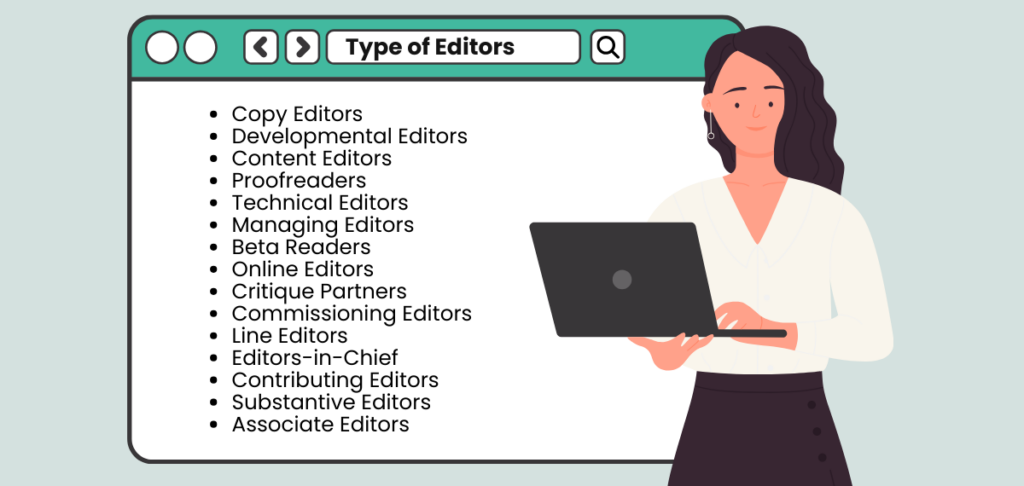There are numerous types of editors in the behemoth world of publishing, each one using a special set of skills to refine, polish, and enhance written work. My quick guide aims to point out and explain the role of each one.
From the meticulous attention to grammar and spelling from copy editors to the structural vision of developmental editors, these publishing professionals play pivotal parts in transforming raw written work into a polished masterpiece ready for the readers’ eyes.
I’ll cover the various types of editors, their role in publishing, the publication cycle, and more to ensure you comprehensively understand all the details.
By the end, you’ll know exactly what editing, proofreading, copy editing, developmental editing, content editing, technical editing, and managing editors look like. Are you ready to get started? Let’s go!

What’s the Role of Editors in Publishing?
Editors are the bridge between a writer’s raw material and the polished final product that hits the shelves or sites. They enhance the text’s clarity, coherence, and readability, working closely with authors and writers to hone their voice and vision into something that resonates with readers.
Editors mainly check for:
- Spelling and grammar mistakes
- Punctuation and other typographical errors
- Coherence and the flow of text
- Consistency in voice
- Formatting and structure.
This is just a tip regarding the various skills editors might offer. As a published author and veteran content writer, I’ve worked with almost every type of editor out there, so I have a pretty good idea of how each one operates. Let’s break down the different types of editors so that you can see where they fit.
Take your grammar skills to the next level
Take Our Copyediting Course
What Are the Different Types of Editors?
Believe it or not, the editing world is rich and varied, with each type of editor focusing on a specific aspect of the written work’s preparation and polishing process.
Sure, sometimes their skills can cross over into different mediums, but, for the most part, no two editors are the same.

Copy Editors
Copy editors are like little busy bees, dedicated to eliminating errors that others might miss during the publishing process. They’re the grammar gurus and syntax superheroes, wielding their knowledge of language with precision and care on your written work.
Goal and Focus
Their main goal is to correct grammar, spelling, and punctuation and ensure style consistency across the text from beginning to end. They’re like the final checkpoint before a manuscript moves toward publication, diligently scanning lines for any inconsistencies or errors.
The focus of a copy editor lies in the nitty-gritty details of language. They ensure that every sentence is grammatically correct, clear, and concise, adhering to the specific style guide of the publication or genre.
Copy editors usually work on a plethora of different materials, including novels, essays, academic papers, and web content.
Developmental Editors
Developmental editors are the architects of the writing world, working closely with authors and writers to construct the framework of their work. They’re the big-picture planners and plot whisperers, guiding the overall direction of the narrative.
Goal and Focus
Their role encompasses improving the structure, flow, and content organization of the written material. They delve deep into the mechanics of storytelling, suggesting changes that enhance the coherence and impact of the narrative.
With a keen eye on the overall structure and development of the narrative, developmental editors help authors and writers refine their ideas into compelling stories or content. As a published fiction author myself, I know what a good developmental editor can bring to the table.
For instance, they might recommend rearranging chapters to improve narrative flow or deepening character development to make the story more engaging. Alternatively, they might pick up on a character exhibiting behavior that they normally don’t.
Developmental editors mostly work on novels, memoirs, non-fiction books, and any other material that benefits from structured guidance and strategic planning.
Content Editors
Content editors are the connection between raw text and compelling storytelling. They’re the content experts and story enhancers, focusing on refining the voice and ensuring that the written work speaks directly to its intended audience.
Goal and Focus
They scrutinize the work to refine its voice and tone, ensuring the content is engaging, clear, and on-brand with the product, company, or person. Any adjustments and suggestions made by a content editor should elevate the quality of writing from good to unforgettable.
Their primary concern is the effectiveness and clarity of the work’s message. Content editors look beyond the surface to ensure the text resonates with readers, maintaining engagement from start to finish.
Content editors typically work on creative fiction, non-fiction, marketing materials, and different types of online content, where voice and engagement are so important.
Proofreaders
Proofreaders are the last line of defense against typographical errors that have slipped past previous rounds of editing. They possess a meticulous eye for detail, catching mistakes that have been overlooked a dozen times already.
Goal and Focus
Their task is to catch and correct typographical errors, minor grammar issues, and other overlooked mistakes, such as incorrect formatting or using the wrong font. They ensure that the text is polished and ready for publication, free from any little distractions that could undermine its effectiveness.
Proofreaders concentrate on the final polish of the manuscript, scrutinizing each word and page for accuracy and consistency.
Proofreaders work across pretty much all written materials, including books, articles, reports, and any content destined for public or private viewing. Basically, if it’s written, a proofreader can work on it.
Technical Editors
The less common technical editor is a specialist who ensures technical documents are accurate, clear, and accessible to their target audience. They’re detail detectives, adept in specialized fields like math and sciences, ensuring that technical content is presented correctly as the medium expects.
Goal and Focus
Their role is to ensure the accuracy, clarity, and usability of technical documents, from user manuals to scientific reports. They work closely with authors to clarify complex information for readers and verify that it aligns with industry standards.
The focus of technical editors is on the precision and correctness of technical content. That means fact-checking, running things by industry professionals, comparing text to similar content in the field, etc.
For instance, they correct a mislabeled diagram in a science textbook or insist that a technical manual complies with any specific industry standards.
Technical editors mainly work on scientific papers, technical manuals, user guides, and other materials that require specialized knowledge and attention to graphs, formulas, and numbers.
Managing Editors
Growing up, this was actually my dream job! I wanted to run some big, fancy magazine, overlooking every single detail from beginning to end.
That’s what managing editors do; they’re the strategists of the publishing process, overseeing the journey of a manuscript from submission to publication. They’re the project managers, coordinating tasks with different departments like graphics and editing and ensuring deadlines are met.
Goal and Focus
They oversee the publication process and coordinate with authors, copy editors, designers, and marketing teams to confirm each phase of the editorial process is executed as smoothly as possible.
The focus of managing editors is on the slick operation of the editorial process and schedule management, confirming that each component of the publishing process aligns with the overall timeline and quality standards.
For example, they set deadlines for editing phases, review layout designs, and coordinate with marketing for a book’s launch. A managing editor for a magazine might be in charge of themes, style, design, layout, etc., and delegate the work accordingly.
Managing editors work in publishing houses, magazines, and online publications, overseeing a wide range of content from books to articles as they move through the publishing cycle.
Beta Readers
If you’re a budding author or planning to work with authors, then you need to know what beta reading is. Yes, it’s a form of reading, but it’s also a form of editing.
The first audience any manuscript could wish for is beta readers. They are the fresh eyes that get to see a story before it faces the critical world. They’re not quite editors in the traditional sense but play a crucial role in the writing process.
Beta readers can be involved at two different points during the publishing process, and it’s up to the author or writer when to bring them in.
If the writer is confident the beta reader can look past glaring typographical errors, it can be once before any edits have been done. Then, again, after several rounds of heavy editing, line editing, copy editing, and more, they can read the written work right before it goes off to publishing.
Goal and Focus
Their main purpose is to provide feedback from a reader’s perspective, pointing out what works and what doesn’t in terms of story flow, character development, and reader engagement. They’re all about the feel of the story, less about the nitty-gritty language details.
They mostly work in the realms of fiction, from novels to short stories, helping authors refine their narratives before they undergo professional editing.
Online Editors

The digital domain’s overseers, online editors, work to ensure that content published on websites and platforms is engaging, accurate, and optimized for the reader’s experience. What looks good on paper or even in a Word document doesn’t always translate online in terms of skimmability or format. An online editor can fix that!
Goal and Focus
They maintain grammatical standards and style consistency, enhance readability, and improve SEO performance. They also tailor content for the digital audience, keeping pace with trends and analytics.
Their playground is pretty vast because it’s the web! This includes blogs, digital magazines, corporate websites, and social media platforms. Basically, anywhere content is king, and clicks are currency.
Critique Partners
Think of them as your writing journey’s companions—fellow writers who exchange manuscripts for mutual feedback. Like beta readers, they provide insights but with an added layer of craft analysis due to their writing experience.
I don’t know where I’d be without my critique partner. I write fantasy romance, and she writes paranormal romance, so it’s the perfect crossover. She has provided me with so many good tips, points, and corrections over the years.
Goal and Focus
They offer constructive criticism on storytelling elements, plot construction, and character arcs, often delving deeper into the craft than beta readers.
Their collaboration is most common among fiction writers, poets, and creative non-fiction authors, forming a supportive network to refine each other’s work. There’s usually no monetary value attached to this service because the give-and-get is reviewing each other’s work. However, there are professional critique partners out there for hire; they operate more along the lines of a beta reader for a fee.
Commissioning Editors
You don’t see many commissioning editors around these days. They’re the talent scouts and project initiators of the publishing world because they identify promising works and authors to bring into their publishing house’s fold.
Goal and Focus
They seek out new content that fits their publication’s catalog, negotiate contracts, and guide authors through the publication process. It sounds a lot like a literary agent, and it’s definitely pretty close.
But commissioning editors don’t just look for good, marketable ideas like agents do. They scan for the quality of writing, how much work the piece needs (or doesn’t need), etc.
If they find a writer whose work is a good fit, they might contact them with a specific project in mind.
Commissioning editors primarily work in publishing houses and literary agencies, working across genres in both fiction and non-fiction.
Line Editors
I always think of line editors as the surgeons of the editing world because they meticulously comb through each and every sentence, enhancing clarity, flow, and readability without losing the author’s voice.
Goal and Focus
They refine written work at the sentence level, focusing on language use, tone, and style so that it resonates with the target audience.
Line editors are valuable in both fiction and nonfiction. They polish manuscripts, articles, and any content that benefits from stylistic refinement.
Editors-in-Chief
The editor-in-chief is like the captain of the publishing ship and holds the ultimate responsibility for a publication’s content, overseeing editorial direction and standards. This is very similar, and often considered the same, as a managing editor.
Goal and Focus
They shape the publication’s voice and strategy with the goal of perfecting the content’s quality, consistency, and alignment with the publication’s mission and audience expectations.
For example, they decide on the thematic focus for a magazine’s upcoming issue and select articles that align with the chosen theme.
Like any good captain, you’ll find them at the helm of magazines, newspapers, online platforms, and publishing houses, steering content creation and editorial policies.
Contributing Editors
These specialized editors contribute content or editing services to a publication regularly or semi-regularly, usually because they bring expertise from a particular field. Contributing editors often operate freelance and can lend their expertise to several publications simultaneously.
Goal and Focus
They provide expert insights and content that enhance the publication’s value to its readers through columns, feature articles, or recurring segments.
They frequent magazines, journals, and online platforms, lending their specialized knowledge and perspective.
Substantive Editors
Substantive editors, or structural editors, delve beneath the surface to analyze and enhance the overall structure and readability of written content.
Goal and Focus
Substantive editors make sure everything is logically organized and thematically consistent, and they have the authority to make significant structural changes as needed.
For instance, they may recommend a complete transformation of a romance novel, transitioning it from a first-person perspective to a third-person perspective.
They mostly work in book publishing, particularly on works that require a strong, coherent argument or narrative structure.
Associate Editors
Associate editors are the right hands to senior editors. They handle many editorial tasks, from content development to final proofreading.
Goal and Focus
Most associate editors work to support the editorial process, ensuring that all pieces of content meet the publication’s standards and deadlines.
For example, they may manage the peer review process for an academic journal or edit submissions for a literary magazine.
They work across the publishing industry in academic journals, magazines, book publishers, and online content platforms, facilitating the smooth operation of the editorial workflow. They often land themselves as the right hand or go-to person of the managing editor or editor-in-chief.
FAQs
Now, here are some of the most common questions that I often see surrounding editing and the roles of editors.
Research editing includes substantive editing for content clarity and argument strength, copy editing for grammatical accuracy, and proofreading for final checks.
That depends on who you ask! Compensation can vary because it depends on expertise, specialization, and experience.
Simply consider the specific needs of your written work: Does it need structural changes, or is it closer to publication and just needs a final polish? Are you writing in English, but it’s not your first language?
Identifying your manuscript’s weaknesses will guide you in choosing the right type of editing service, ensuring a focused and effective editing process. This means stepping back and looking at the work from an outside perspective, not that of the writer.
That Concludes the Editing Rainbow
Editors play such an important role in the journey from draft to published work, applying their expertise to refine and enhance writing across genres and formats.
Whether you’re drafting a novel, compiling scientific research, or creating compelling but fun web content, investing in professional editing services can dramatically elevate your work’s quality and impact on the readers.
Remember, behind every great writer is a great editor—or, more accurately, a team of them, each specialized in different stages of the project. If you want to learn more about editing or how to become an editor, check out our other helpful guides and courses!
